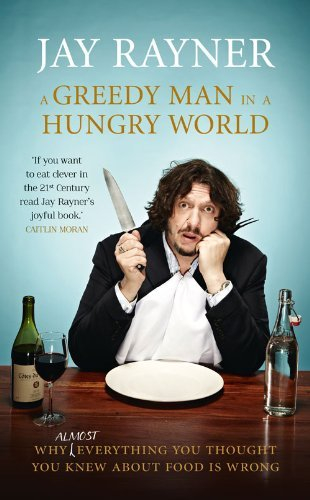- Daily & Weekly newsletters
- Buy & download The Bulletin
- Comment on our articles
Kitchen controversial: an interview with Jay Rayner
As The Observer’s restaurant critic and the One Show’s resident food expert, Jay Rayner has made a name for himself as a no-nonsense foodie, a man with a ferocious appetite and no time for fads or style over substance. Yet behind his imposing frame and his ability to wax lyrical over simple food cooked well lies an old-fashioned journalist with an inquisitive mind, who likes to get to the bottom of things as much as to the bottom of a bowl of lip-numbing Szechuan lamb broth.
His latest book, A Greedy Man in a Hungry World, addresses the burning issue of sustainability and, more generally, feeding a planet with a population expected to reach nine billion by 2050, and takes us on an investigative journey to Rwanda and Ohio via a Yorkshire abattoir. Among the seriousness of the issues raised, the autobiographical flashbacks and the memories of his late mother, the formidable agony aunt Claire Rayner, make Greedy Man a positively compelling hybrid – part essay, part frontline reporting, part memoir.
In Greedy Man, Rayner challenges received foodie wisdom by understanding what real food production means and what it entails. His conclusions (local is not the same as sustainable; large-scale agriculture is necessary; rejecting biotechnology is plain stupid…) are guaranteed to ruffle a fair few feathers in the self-righteous foodie sphere. The perfect opportunity to ask a few questions to the man himself.
Some of the points you make in the book, such as challenging the value of organic food, must’ve been like a red rag to a bull within the ranks of the ‘knit-your-own-yoghurt’ brigade.
To be fair, I haven’t had too aggressive a response from them. Anyway, the book isn’t black and white. Even though I question the value of organic food, I do realise that the organic movement did an awful lot for moving the plate forward. Without them, I don’t think we’d be where we are in the debate about sustainability. The whole point of the book is that there are no polarised arguments, we have to look at everything in the round, although the book may have been sold on certain quite savage headlines. One of the most intriguing responses I had was from the people at Treehugger.com who, like many people, took exception to the chapter about local food. I got in touch with them and said “look, I think you need to read the whole book so you can get a real sense of it”, which they did, and they wrote a review which was very positive indeed. Even then, you have to recognise that there are values to local food. That was one of the key things that they would always be cross with me about, because they thought I’m dismissing local food full-stop, which I’m not.
 Several food campaigners tend to demonise people who buy cheap, unethical products such as ‘economy’ chicken when in fact it’s all they can afford…
Several food campaigners tend to demonise people who buy cheap, unethical products such as ‘economy’ chicken when in fact it’s all they can afford…
There is a tendency among people in the food world (journalists, cooks) to occupy a lifestyle position which suits them as a marketing brand. And they can look like they are being exceptionally dismissive of people trying to lead normal lives. It is much easier to lead a ‘River Cottage’ lifestyle if your entire income is based upon leading a River Cottage lifestyle. But people’s lives are complicated, and demonising people for the choices they make in complicated situations isn’t going to serve anybody, apart from making you feel more superior. We need the debate to be wider, or the debate to be bigger – it’s vital.
Isn’t the widely held view that small-scale farming is preferable to ‘big agriculture’ just another form of snobbery, which you also find among indie music fans who shun ‘commercial’ records?
Aesthetics always bring with them a certain snobbery, and snobbery where aesthetics are concerned is not always a bad thing. It’s ok to say that one thing is better than another when it comes to aesthetics, to taste. After all, I’m a restaurant critic – I care how things taste. But those are very different arguments to arguments over how we produce the greatest yield for the smallest environmental footprint. Undoubtedly, the food world is full of snobbery and people grandstanding to make themselves appear to have better taste than others and that’s fine up to a point if that’s how you want to pass your time but what’s key, and the point of this book, is production scale and the ability to feed people.
In your previous book, The Man Who Ate The World, you debunked the myth that ‘authentic equals good’ (describing a traditional Emirati dish of lamb cooked in dried yoghurt as “foul” and “putrid”). One gets the impression that myth-busting brings you great satisfaction.
The suggestion there is that I might be doing this because I like being an awkward bastard! (laughs) Listen, there’s no point in writing a book if you’re merely going to agree with what everybody says. But you do have to have good reasons for why you might be picking off your targets, and underlying that has to be proper reportage. I’m getting a bit pious about this, but I am first and foremost a reporter; there is always a notebook close to me and that’s what matters.
A Greedy Man in a Hungry World by Jay Rayner, 288 pp, is published by William Collins

















